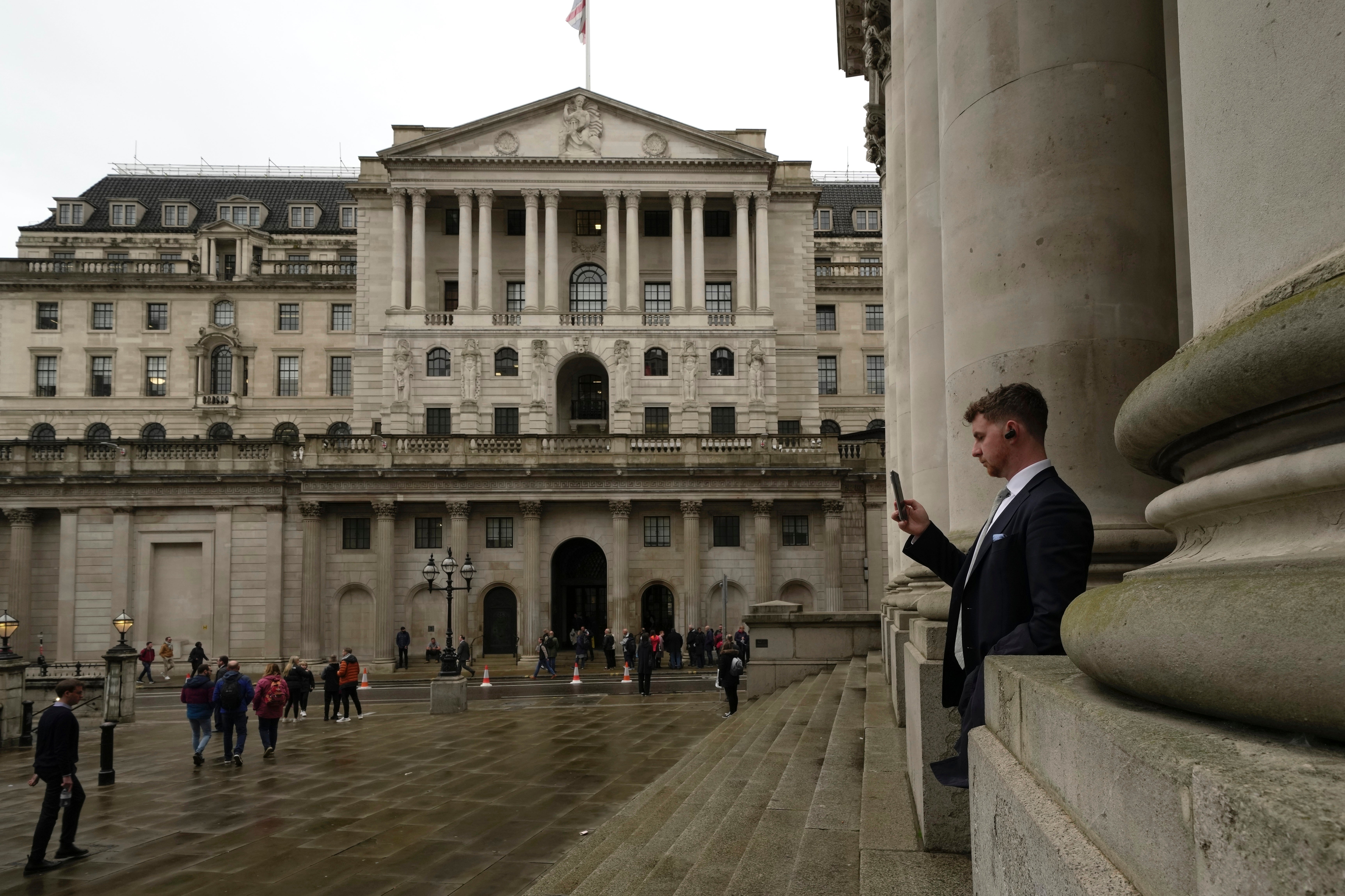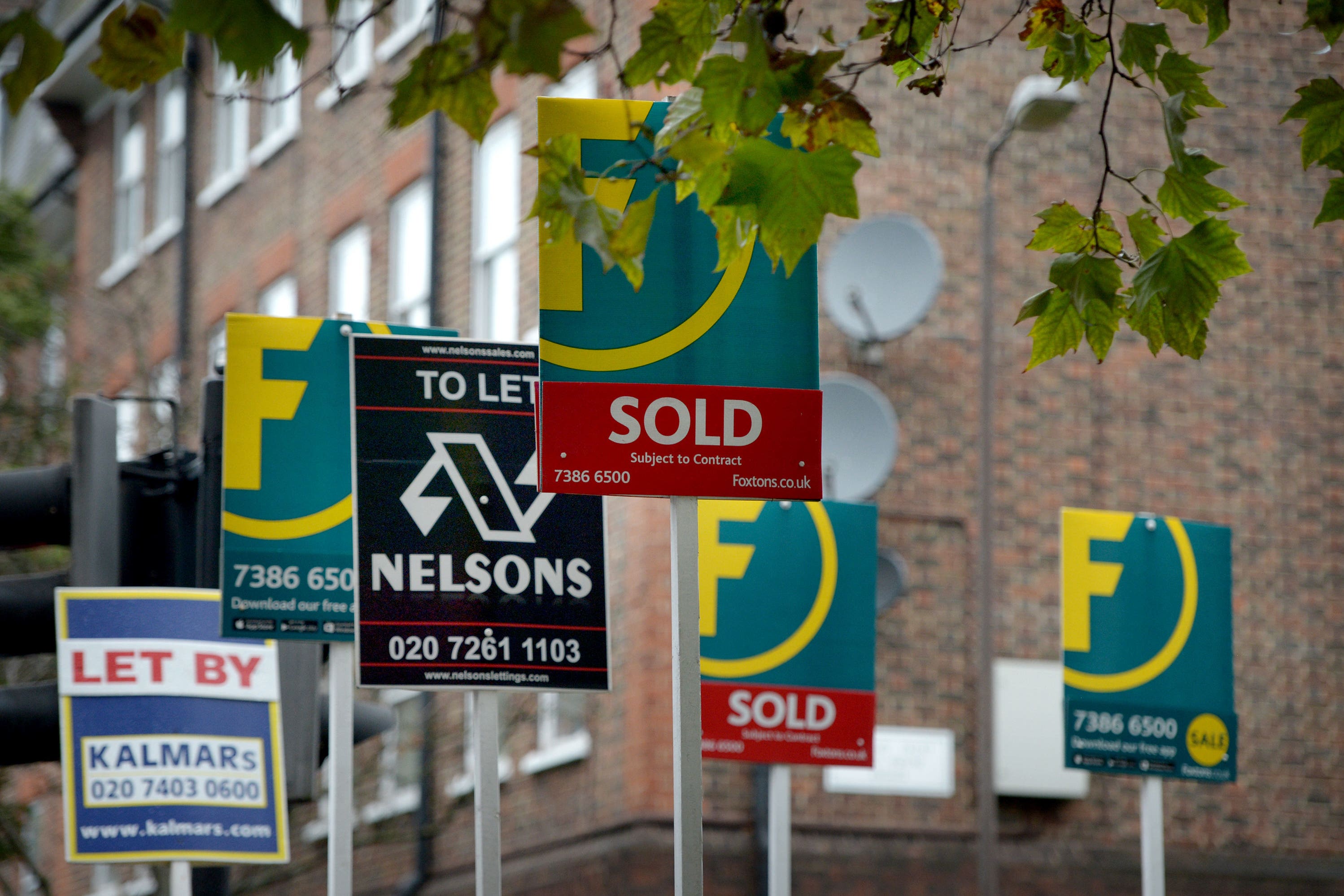Interest rates - live: Bank of England predicts ‘shallow’ recession but warns ‘it’s not over yet’
Central bank confirms further 0.5 per cent hike, bringing base rare to 4 per cent
Your support helps us to tell the story
From reproductive rights to climate change to Big Tech, The Independent is on the ground when the story is developing. Whether it's investigating the financials of Elon Musk's pro-Trump PAC or producing our latest documentary, 'The A Word', which shines a light on the American women fighting for reproductive rights, we know how important it is to parse out the facts from the messaging.
At such a critical moment in US history, we need reporters on the ground. Your donation allows us to keep sending journalists to speak to both sides of the story.
The Independent is trusted by Americans across the entire political spectrum. And unlike many other quality news outlets, we choose not to lock Americans out of our reporting and analysis with paywalls. We believe quality journalism should be available to everyone, paid for by those who can afford it.
Your support makes all the difference.The Bank of England has said that the UK’s recession will be shallower than expected but warned that it is “too soon” to declare “victory” over inflation as it hiked interest rates for the 10th consecutive time.
The UK’s central bank announced at noon it was - as widely expected - increasing the base rate by 0.5 per cent to 4 per cent, in a further blow to borrowers and those on tracker mortgage deals.
"It is too soon to declare victory just yet. Inflationary pressures are still there," Mr Bailey said in a press conference as he explained why the Bank had chosen to hike yet again as millions struggle with the cost of living squeeze.
He added that the Monetary Policy Committee had softened its language on future rises in interest rates because the economy is turning a corner on inflation.
"I think that reflects that we have seen a turning of the corner, but it’s early days and the risks are very large. And it’s really that which shapes where we go from here,” he said.
Reaction: Another blow for small businesses
Caroline Plumb, CEO of Gravita, said the Bank’s decision to hike interest rates by another 0.5 per cent is a further blow for small businesses.
She said: “Another rise in interest rates makes a difficult situation even worse for small businesses. Many are already struggling with soaring energy prices, the impact of high inflation and uncertainty over the future of R&D tax credits and this latest hike is another blow during a tough time for SMEs. We could start to see a rise in insolvencies in the months ahead.
“Yet Britain’s entrepreneurs and the businesses they run are inherently resilient and often look back on times of economic turmoil as definitive moments.
“By having a full understanding of their cash flow, implementing comprehensive financial scenario planning and seizing opportunities for growth whenever they can, small companies will be in a prime position to bounce back when the economy begins to improve.”
Breaking: Bank confirms interest rise to 4%
The Bank of England has raised interest rates from 3.5 to 4 per cent - the tenth hike in a row.
More follows...
Announcement expected imminently
The Bank’s decision on interest rates is expected in a few minutes’ time.
We’ll be bringing you updates once the expected hike is announced plus reaction from the city and elsewhere.
Stay tuned for all the latest.
Days of cheap money are over - former bank policymaker
The days of “ultra-low” interest rates and cheap money are over, a top economist has warned.
Michael Saunders, a former member of the Bank’s MPC, spoke to Bloomberg earlier ahead of today’s expected rate hike.
He said the conditions before this year were “exceptional” and that “inflation expectations are likely to be persistently higher, requiring a slightly higher nominal interest rate.”
Watch more of his comments below:
When is the next decision on interest rates?
Interest rates are set by the Bank’s Monetary Policy Committee, which has nine members.
They don’t always agree on how much the base rate should rise and the final decision is based on a majority vote.
We should find out how today’s vote went after the expected hike is announced.
The MPC meets eight times per year. Its next meetings are scheduled for the following dates:
- 23 March
- 11 May
- 22 June
- 3 August
- 21 September
- 2 November
- 14 December

Can the government bring down inflation?
In a speech earlier this year Rishi Sunak, the chancellor, said his government aims to halve inflation as he set out his five priorities for government.
The current rate of inflation is 10.5 per cent but Andrew Bailey, the Bank of England governor, said rising prices will likely fall “rapidly” this year.
The main lever used to bring down inflation is to raise interest rates, which makes it more expensive to borrow money and adds to things like mortgage costs.
It is hoped that, because people have less money in their pockets, this will dampen down demand in the economy and lead to lower prices.
Inflation has largely been driven by sky-high energy bills, which are starting to come down due to the falling price of wholesale gas and electricity.
Interest rates are set by the Bank of England, which is independent from the government.

What are interest rates, and how do they affect inflation?
We’ve been reporting a lot this morning about rising interest rates - but what exactly are they, how do they affect inflation and everyday life?
An interest rate is a measure that tells you how high the cost of borrowing money is, or how high the rewards of saving are.
Low interest rates are used to discourage people from piling up their money in savings.
High interest rates encourage saving because people get a better return for the money you are putting away.
More below:

All you need to know about interest rates and how they affect you
Borrowing costs have surged in the last year as the Bank of England set to announce latest rates rise
House prices to drop 10% this year - Santander
High street lender Santander has warned house prices are set to tumble back to 2021 levels, and set aside more cash for bad debts as it braces itself for a possible rise in borrowers falling behind with repayments.
The Spanish-owned group is pencilling in a 10% fall in house prices this year as interest rate hikes knock homebuyer demand and a 1.3% contraction in the wider UK economy over 2023.
Its full-year figures showed the group put by £321 million in 2022, including a further £65 million in the fourth quarter, as an expected recession in the UK is set to weigh on borrowers, warning that the cost-of-living crisis could start to see customers fall into arrears.
This compares with £233 million of credit provisions being released in 2021.
Santander said: "We expect house prices to fall back to 2021 levels over the year ahead as higher base rates dampen demand."
It added: "The outlook remains uncertain as inflation has eroded real disposable income with the prospects of a recession ahead.
"These challenges for households and businesses are expected to continue into 2023 and could impact credit quality."

Australia announces decision to remove British monarchy from its banknotes
In a move that spells the phasing out of the British monarchy on its currency notes, Australia has announced that its new $5 bill will not feature an image of King Charles III.
Australia’s Reserve Bank announced on Wednesday that a new design celebrating Indigenous culture will replace the previous portrait of the late Queen Elizabeth II.
The bank said that the decision is aimed at honouring “the culture and history of the First Australians”.
My colleague Sravasti Dasgupta reports:

Australia announces decision to remove British monarchy from its banknotes
KIng Charles III is expected to continue to feature on coins
Interest rate hike will hit borrowers hard
William Marsters, senior UK sales trader at investment platform Saxo, said today’s expected Bank hike will be another below to borrows.
He said: “Today the Bank of England looks set to raise interest rates for the 10th time in a row, expected to be up from 3.5% to 4%.
“With inflation currently at 10.5% the Bank has been stuck between a rock and a hard place for a long time with little to no choice but to hike rates again with a target of reducing inflation to as low as 2%.
“This rise in interest rates has hit borrowers hard and those with large mortgages or credit card loans in particular will continue to feel the squeeze with the cost of living already tightening any kind of consumer purchasing power. Some homeowners have even decided to roll the dice and apply floating rates to their mortgages, taking the pain now in the hope that inflation will soon reduce and rates turn lower again later in the year.
“The UK is still likely to enter a recession in the coming months, something the BoE would have had to factor into their decision, and in the long term this should see consumer prices pressured, though many businesses will be negatively affected with costs already proving difficult to manage.”




Join our commenting forum
Join thought-provoking conversations, follow other Independent readers and see their replies
Comments